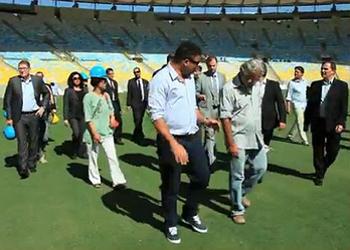
CURITIBA, Brazil, August 19, 2013 (ENS) – Environmental sustainability is on the minds of stadium managers from the 12 Brazilian cities that will host football, or soccer, matches next year during 2014 FIFA World Cup Brazil.
Just days before the sale of 2014 FIFA World Cup tickets opens tomorrow, FIFA and the Local Organising Committee hosted the first of three workshops of a Sustainability Training Program for the operators of the 12 stadiums that will be at the center of attention in 2014.

Over the course of the two days, August 16-17, representatives of the 12 host cities shared their experiences of what had been done in terms of sustainability and worked on areas that could still be improved, both environmentally and socially.
“Here we tried to convey the core concepts of sustainability. We spoke at length about the environment, awareness of energy and water consumption, as well as social responsibility, interaction with the community, labour issues and relationships at work,” explained Marcia Menezes dos Santos, chief instructor at the training program and director of the Special Projects Unit at the Centre for Building Technology, a consultancy specializing in sustainability for buildings.
“The objective over the three workshops is for the stadium operators from the 12 host cities to understand the processes and concepts and to bring them into their routines in an evolutionary way,” she said.
In theory, sustainability has been an area of interest for the 12 host cities of the 2014 FIFA World Cup Brazil since the initial planning stage; in practice, a number of projects have already left the drawing board and yielded results, workshop organizers say.
But many of the stadium operators are not experts in sustainability and need to expand their knowledge on the subject, in order to manage their complex facilities with the environment in mind.
“Back at the World Cup host bidding process, we decided that FIFA would support local sustainability projects as long as it would not be limited to stadium construction,” explained Federico Addiechi, head of corporate social responsibility for FIFA.
“For us, what’s important is supporting operations and the future management of these installations in a sustainable way,” Addiechi said.
“We’re not talking just about the World Cup here, but the life of the stadium beyond that,” said Ricardo Trade, CEO of the Local Organising Committee. “We will leave a legacy both regarding the new stadiums themselves and also in terms of administration for future management.”

At the newly completed Pernambuco Arena, a one megawatt solar energy plant will produce power and the roof captures rainwater to be reused in the arena itself.
With six of the 12 arenas already completed, representatives of the host cities spoke about the challenges they have faced at various stages. Many concluded that it is not always easy to make the transition between sustainability plans during construction and making those plans the new reality after the stadiums are inaugurated.
Everyone agreed that achievements such as these would not have been possible without the FIFA World Cup.
“The state of Mato Grosso is reputed to be responsible for the most deforestation in the country, due mainly to soya and corn plantations. We wanted to change that image. So we decided to take advantage of having the FIFA World Cup here,” explained Joao Paulo Borges, special adviser to the Extraordinary Secretariat of the FIFA World Cup in Cuiaba.
“We were the first host city to think about sustainability, in as much as the Arena Pantanal had relied on environmental studies from the outset with the aim of getting a LEED certificate,” he said.

With encouragement from the federal government, other stadiums followed suit because financing by the Brazilian National Development Bank required an environmental certificate.
“For the Brazilian government, the question of sustainability was inextricably linked with preparations for the FIFA World Cup, as much in terms of the stadiums as with the legacy the World Cup would leave our country,” said Ricardo Gomyde, director of professional football at Brazil’s Ministry of Sports.
FIFA officials say the initiative worked so well that the environmental certificate now features on their list of requirements for the next FIFA World Cup, starting in 2018 in Russia.
“Our city is already known as an ecological city; we are now working towards it being sustainable, too,” said the secretary of the Extraordinary Secretariat of the FIFA World Cup in Curitiba, Reginaldo Cordeiro, who was representing Mayor Gustavo Fruet.
“Even in terms of urban mobility, we have worked hard in terms of sustainability, for instance – our investment in cycle paths,” said Cordeiro.
The stadium operator training program has received the support from the Ministry of Sports and the Curitiba City Hall. The next workshops are scheduled for November 2013 and February 2014, with locations to be decided.
Based in Zurich, Switzerland, the Fédération Internationale de Football Association, FIFA, is the international governing body of association football, with a membership of 209 national associations.
Copyright Environment News Service (ENS) 2013. All rights reserved.
© 2013, Environment News Service. All rights reserved. Content may be quoted only with proper attribution and a direct link to the original article. Full reproduction is prohibited.
